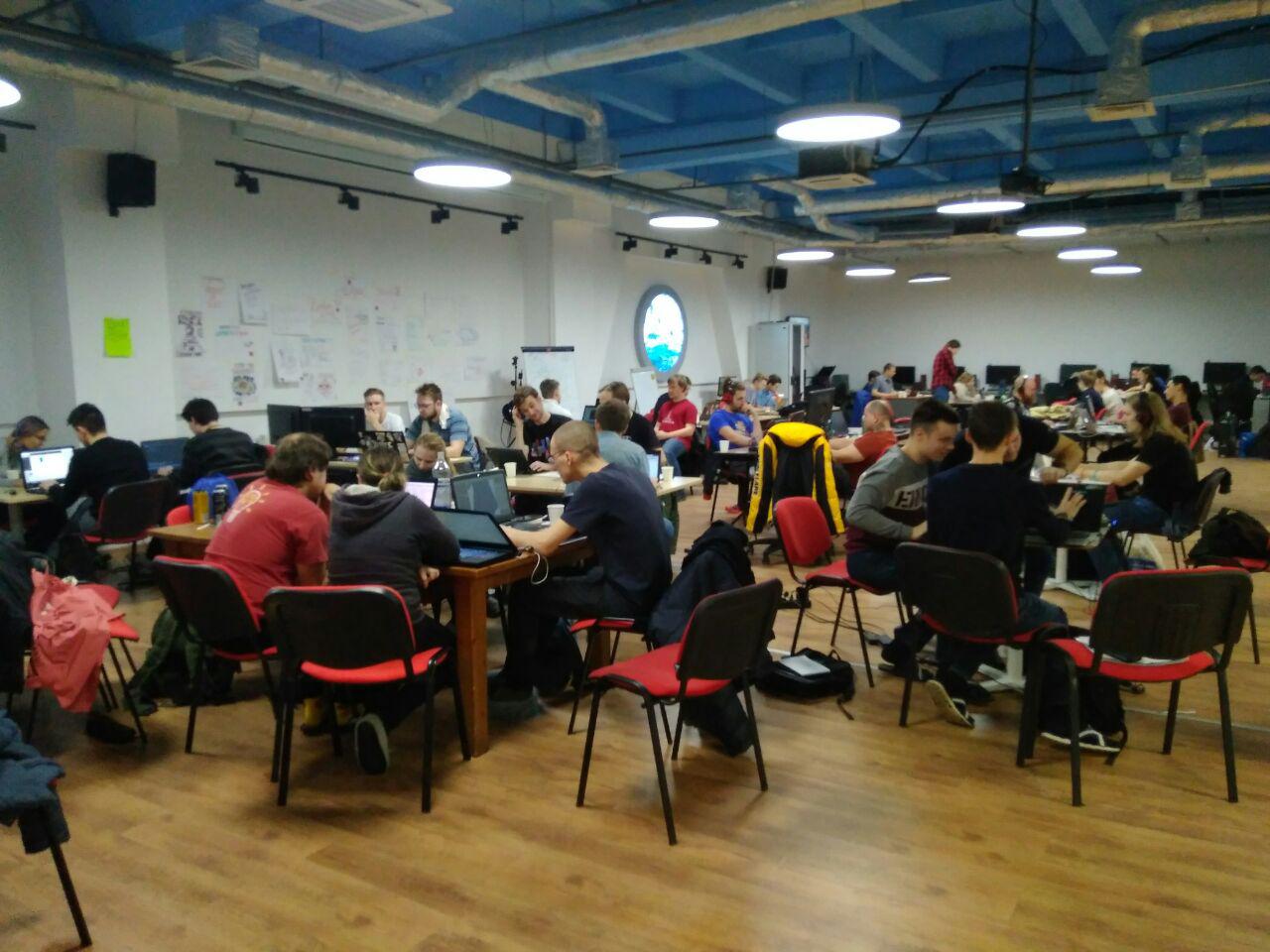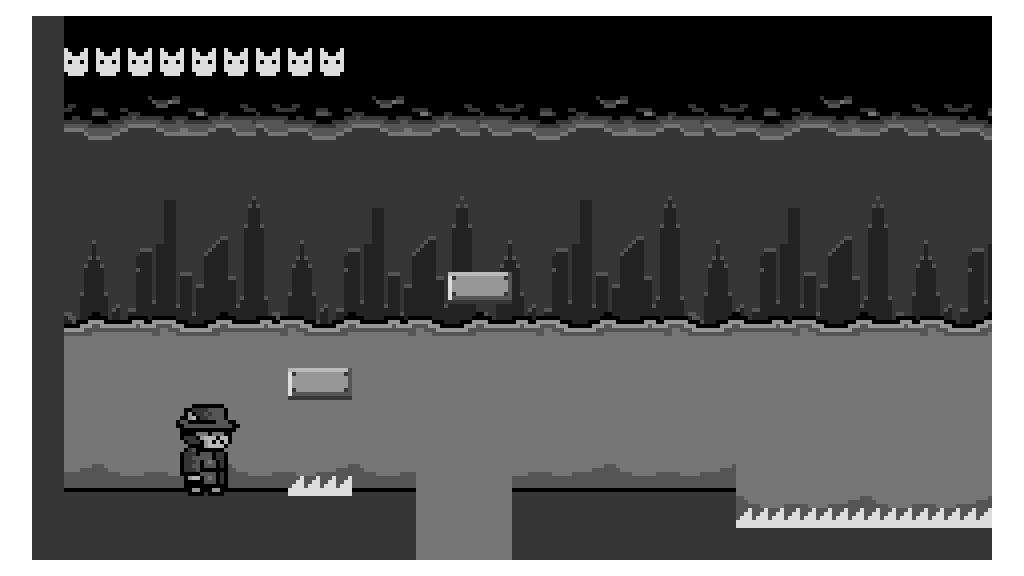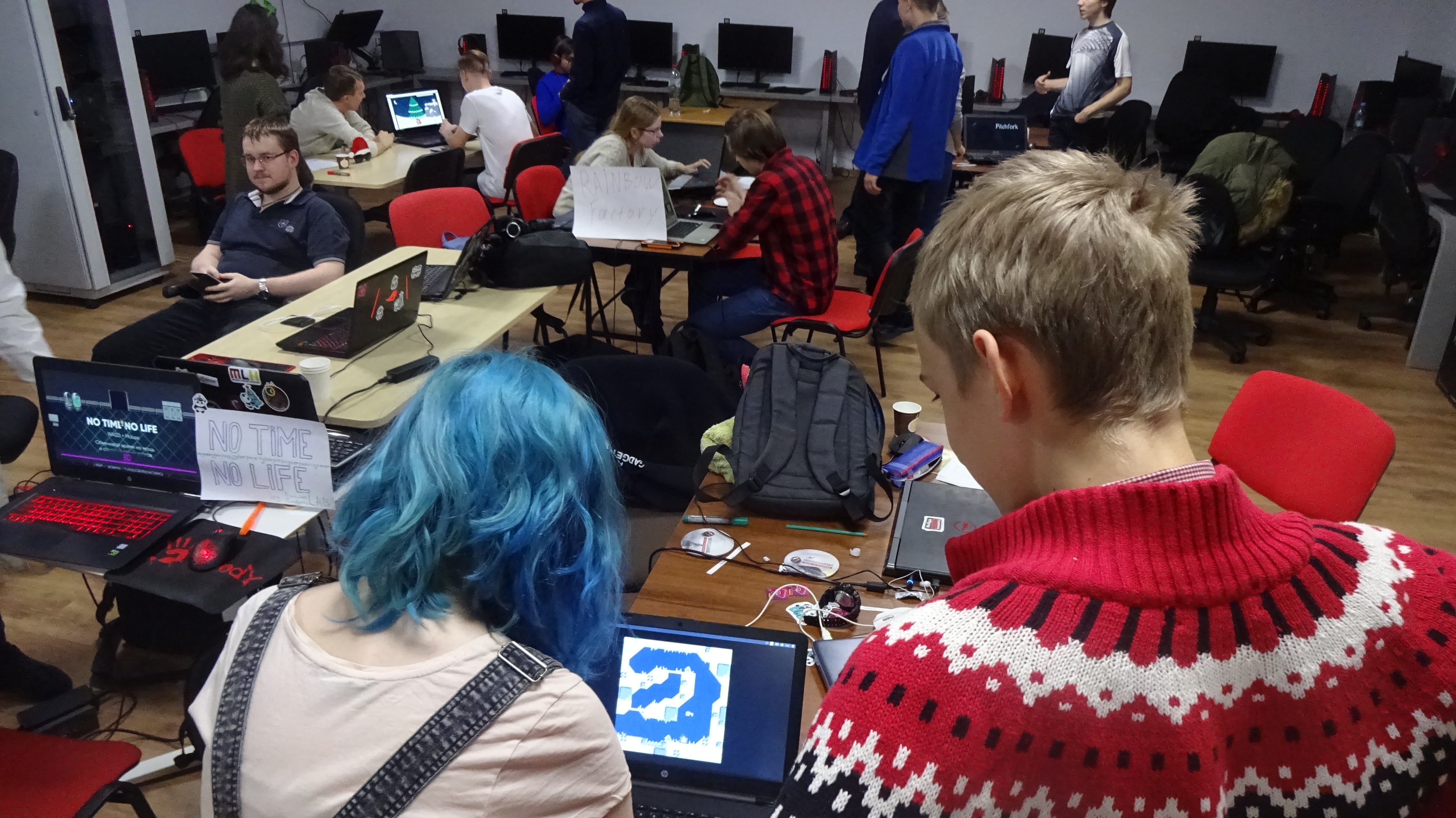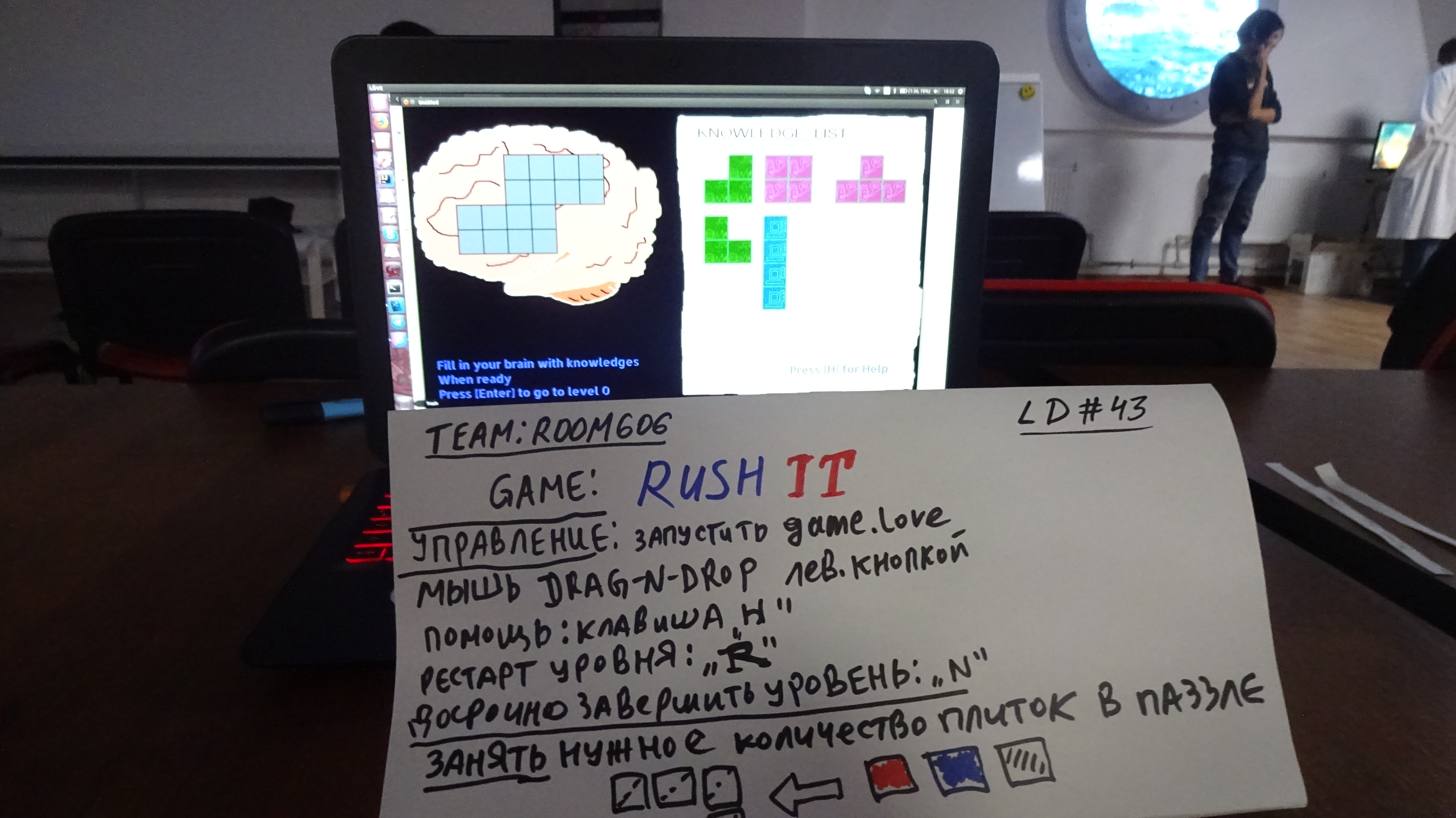How Emelya went on Ludum Dare
Briefly about the event
On the phenomenon of Ludum Dare already have a lot of materials, articles and discussions. For example, here , here or here , but still there will be a small introductory, minimal context.

Ludum Dare is an accelerated computer games development competition. It was founded by a guy named Geoff Howland and was first held in April 2002. In just a couple of days, you are plunging into a crazy adventure with an unexpected finale. At the beginning, you only have a topic (which is chosen on the eve of the event through several rounds of voting from the community-generated pool of topics), and what you can do at the end is impossible to predict, and this is intrigue, excitement and one of the things that makes people and re-sacrifice yourself for a couple of days to this event. By the way, about the victims. The theme of the past, the 43rd Ludum Dare was - "Sacrifices Must Be Made". And it is here that the flight of fancy to interpret this formulation is simply unlimited.
I will summarize the main rules ( Compo mode):
- You have to work alone (by
). - All game code and content must be created within
48hours. - Games must be based on the theme.
- All publicly accessible libraries and middlewares are allowed.
- All content creation and development utilities (3dsmax, Photoshop, Flash, etc.) are allowed.
- The
must be attached to the game.
In general, there is an official site where you apply for participation and download all the materials on the game, vote, play games of other participants, in general, you get that same fan and a feeling of a general holiday.
In this article I will share the experience of their participation and personal perception. However, I will not talk in detail about my project, the technological side of the issue, or any difficulties in participating in the general competition on the official website. Not. I would like to pay attention to a side aspect of the event - offline participation in the office with real people working side by side in the same space. This is what impressed me and gave me the buzz the most!
In our vast city there are cities with an already established get-together, where a two-day game-marathon is held regularly in the offices of IT companies. For example, in Omsk, a very strong movement and the level of organization and quality of projects cause respect.
In Novosibirsk in Akademgorodok also hold Ludum Dare.
In St. Petersburg, this culture is also developing and going to the masses thanks to a few very nice and very initiative guys.
Impressions
As a participant I participated in Ludum Dare for the second time, before that I visited Ludum only on the second day, I tried projects on the computers of the teams at the game fair. And the second time I tasted all the delights and sipped all the sorrows and must declare - I do not regret at all the time spent.
I just tried to feel everything that I was doing and what was going on around me, while at the same time being in an endless stream, under the pressure of all deadlines, risks and expectations. Yes Yes! It is here that almost everyone falls into such a high-quality stream that any picture with a cat or a NSFW gig is powerless to tear your mind away from mental activity. You are 99% focused on the project - getting shit done, so to speak.
You see here a team of several people, enthusiastic singles, a couple of bosom friends or just a couple (husband and wife, a guy with a girlfriend). All this is very interesting, very exciting, you involuntarily intersect with someone, sometimes you ask what technology people are doing their project and fascinate with the engine's capabilities or how masterfully this guy at the next table owns his favorite tools, his brain and his skills writing games, creating levels and textures.
Common mistakes I made
So, let's go over the rakes that I collected, participating in Ludum Dare my second time.
- I didn’t do a proper job of thinking through the prototype, the game mechanics and the catchy chips that make the challenge to the player, holding him in my game.
- I did not plan a deadline plan with key marks (stages, if you will) of what should already be in my repository.
In order to justify myself a little, I will say, of course, I kept on a piece of paper small TODO lists, where I wrote that now I would do A, B and B. And I took it, methodically performing and crossing out point by point. But all these were only those intermediate phases, not connected with each other by a single goal and not included in any time frame. I kept a kind of plan in my head, but of course I was not very focused on it, I was distracted by something, I was fond of fixing some small things, forgetting about the global picture and the goal - to give players an interesting game. - He knew his tools badly.
The technologies chosen were: Love2d, the Lua language, and some graphic editors for Linux. Of course, I studied the engine, studied short lessons on Lua. And before the competition I tried to write a game. However, I didn’t manage to make a single whole game, I covered up a few topics on game development - basic techniques, techniques, patterns, game design chips. And of course, he was poorly informed and poorly oriented in the ecosystem of the selected engine, where there are already lots of good libraries and various plug-ins for all typical needs of video games.
1876 . So many lines of code summed up my project by the end of the second day. I’m sure the code could be more compact, more concise and simpler, if I had selected libraries and solutions that I knew and understood for all subsystems of the game, and then, my speed would be much higher, and the quality would be better.
As a result, I spent a lot of time coding my own bike for the tile system, defining overlaying and intersecting tiles, rendering these tiles, the smart drag-n-drop system, etc. Perhaps this can not be attributed to an error, rather to the lack of a lot of experience, I just have not yet filled my hand and have not expanded my horizons in this area sufficiently.
What gives offline participation in Ludum Dare
Implementing your idea and participating in universal voting on the site is certainly a valuable and cool experience. But let's try focusing on the Ludum offline format. So, a number of key utility, which I noted for myself.
Inspiration
In the format of meetings, you communicate with real people, see how people write code, design levels, draw textures and compose music. I watched the artists and musicians who brought their equipment, some unbelievable midi-consoles, and this is very cool. I occasionally approached people and trying not to distract from the process, figured out what technology people were doing the game or exactly how they made some special effect or chip.

(One of the games that won the prize in offline voting is Paw Of Black)
Such an event gives you the strength and motivation to take and sit down at your current project, to undertake to implement future long-playing projects. Yes, just knocks out all the laziness and uncertainty. You absorb a lot of ideas, wonder at different approaches and how people take to work. In the office where I visited, people of quite different ages gathered - students, high school students, adult men. But age differences melt away in the general euphoria and dedication to competition. To summarize, for me in terms of inspiration, it gave:
- motivation
- fresh ideas
- the realization that it all fascinates me and I am ready to devote time to the topic of game development - both as a leisure and as a skill development of writing video games.
One young man was just a blow to me with his skills, talent and involvement. The guy so masterly knew and owned his favorite tools, that in front of me he put it on for half a minute and showed what the platform he was using was capable of. By the way, he chose a very outlandish (for me, and I am sure, for many not very involved in the game-dev scene) platform - PICO-8 . Be sure to read about this phenomenon of video game systems - this is a virtual gaming console. All so, there are no official hardware products of such a system (there was one limited edition series of mini-computers with PICO-8 installed, but it seems the project has sunk into oblivion, the site no longer works). Only executing software that emulates a fictional console.
Experience the sharpest deadline
On the scale of a large IT project or a single sprint, deadlines are usually rare and, with good organization of processes, competent leads and managers do not beat centrally on the CNS developers. However, here, you are somehow compressed within the framework of rigid, inexorably approaching terms. And this is exactly the very chance to show your talent for planning, risk taking, prioritization, perseverance and stress tolerance. In two days (in Jam-mode - three), you need to bring your idea to a working and catchy product player with a key chip, a theme, with a certain graphic component, clear control and with the element of challenge in the end! Otherwise, it will be just uninteresting to play. Now try to fit all these aspects into a two-day cycle. By the end of Ludum Dare, I felt a kind of burnout, when I no longer wanted to do anything, just go with the flow of life and not make extra efforts.
Skill competent design and writing prototypes
What I learned firmly and ironically for myself after two days of Ludum was the following simple rule:
Simplifying - simplify.
We need to work on the most simplified and minimalist project that has only one or two basic ideas that you came up with on the topic of Ludum . This means a minimal set of functions, easy to maintain, test, composable if needed into derived elements that will add variety or improve your game. Just the day before I read an article about the importance of prototyping in game dev , and it came to my mind when I left home from the event. It is here that you need to find the ideal level of abstraction and detachment from details, nuances, branches and complex lists of rules.
Your game, produced in such a short period of time, is the essence of the brightest example of MVP, the prototype before the start of the project, if you wish, a technological demo of your idea to investors. You can probably pick up other analogies from related areas and areas.
If the truth is very limited to the set of conceived functionality and set the simplicity of work and ease of interaction of all the functions of the game - then there will be many chances to have time to make the game with all the components described earlier - there will be a chip and levels and graphics and music and a competitive element.

(Participants stuck to a laptop with a running game Jlim - a game launched on the very PICO-8)
I also very clearly noticed for myself how much this two-day (for me, two-day due to Compo-mode) marathon is a good and clear illustration of what happens with the code base of the project, if you make gross developer errors.
When you make mistakes at the initial stage, designing poorly expandable, inflexible constructions, use patterns wryly or choose a completely inappropriate approach or pattern, ignore the good readable names of functions, variables and components, select non-intuitive interfaces. By the end of the first day, my code was very swollen and was already turning into a formless mess. Responsibility and abstractions literally flowed from "class" to "class" and this, of course, gave rise to difficult debugging bugs, slowed down development, testing, and eventually completely disrupted all my deadlines and discarded all my plans to introduce chips into some utopian unreal future.
Skill speeches and presentations
With offline format, you usually leave the whole team (or you personally, if you participate alone) in the center of the room and announce your project, even before it is ready. You introduce yourself, describe your idea, key pieces, the setting, Lore, if you like, describe the technologies you plan to use. You also need to prepare a certain poster (the participants simply painted with random markers on large sheets of A3 posters with an arbitrary design to their liking, signing the name of the team, the name of the game, any other information that the team considered valuable). Yes, it's just a few minutes, yes, you are not in front of an audience in a large speaker hall, but still - what is not an opportunity to practice a little oratory, the skill of selling ideas, in the end just do not be afraid of the public and its close attention and pressure. Here everyone is friendly, everyone is joking and supporting each other, so that everything happens in a soft and smooth form, and here there are only pluses, no minuses.

Also, in my case, at the end, during the gaming fair, I had to go on stage again and play a little of my game (the organizers displayed a picture on a projector, a sound on speakers), so to speak a demo with comments that the game eventually went why you should try it, what you did, what you are especially proud of, where you failed, all again, in a free form, for a few minutes. And this is another small training for your speaker and demo skills.
Leadership and teamwork skills
In case you filed with the application, not one, but the whole team, you have additional time and additional resources, but also a bunch of new interesting questions and problems. You need to parallel the work, to delegate, to adhere to the general line, design, theme and the general level of the quality of the game, in the end. It is not so easy. In short, we have a typical project to develop, only very creative, to develop a game.
During my visit to Ludum offline, I had several occasions to observe a split drama in a team, conflicts, misunderstandings of each other, processes, and all this of course had a bad effect on the final result. Either the person went to another team, because he felt more needed elsewhere, or the project was slowed down or the planned deadlines were broken, and then the team sacrificed many pieces of what was planned.
Cons Ludum Dare
The disadvantages of participation in such an event include:
- Very strong stress and exhaustion. These two days really take your mental, emotional and nervous resources. Therefore, it is recommended to complete such a marathon with a walk in the fresh air, a good portion of sleep, or some relaxing activity to simply escape from such a busy routine.
- Possible conflict with relatives and relatives. This is certainly a controversial point, but anyway, this is the time you completely donate to a get-together, and you need at least to discuss your plans with your soulmate at least in advance. If your second half is an understanding person, you are very lucky and big. Feel free to go write a cool game, and then return to reality.
Thanks
I would like to thank the organizers of St. Petersburg Ludum Dare (you are great guys, keep up the good work!), The company and their employees who allocated the office to participate in the event, organized the whole process (provision of electricity, Internet, provisions for two days, necessary video-audio equipment, all questions logistics and organization, everything was cool). I also thank the creators and managers of the Love2d engine, the open-source community of this ecosystem and my wife.
')
Source: https://habr.com/ru/post/432590/
All Articles